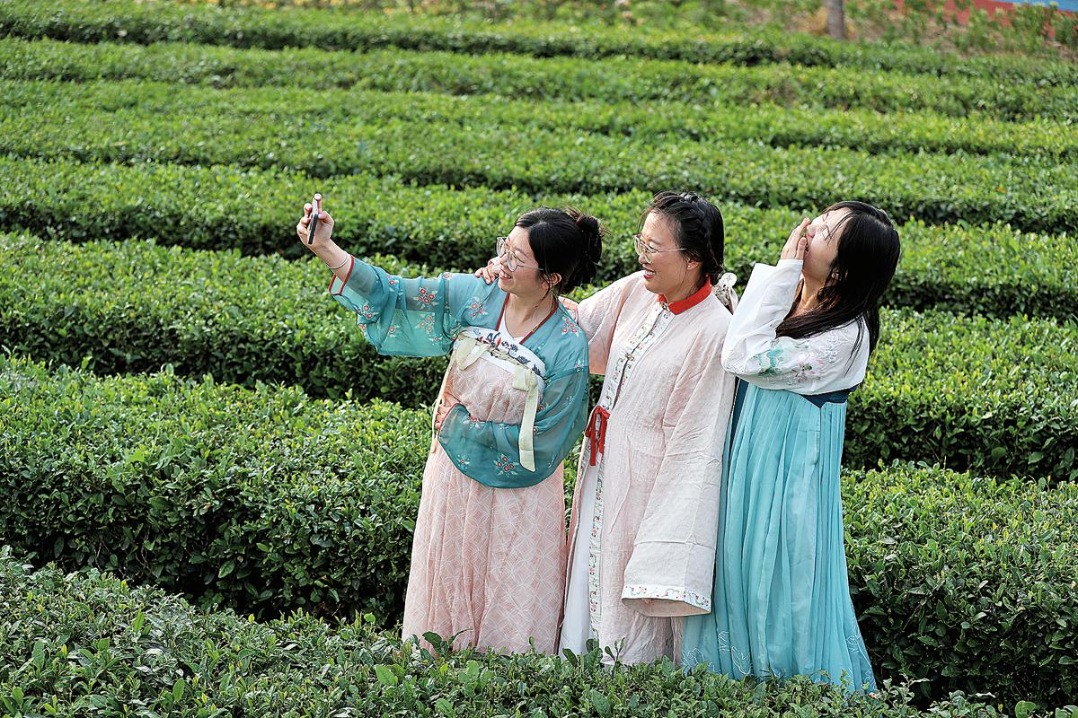KTV out of sync with youth, but in tune with retirees

The neon-lit karaoke parlors that dot Chinese cities were once a top choice for exuberant youth celebrating birthdays, going on dates or simply unwinding. Singing in a private karaoke room, reading lyrics from a high-definition television, and hearing your voice and sentiments vented through speakers was a highly sought-after experience a decade or two ago.
But today, it's a different story. The appeal of karaoke has waned, sparking discussion across social media. A hashtag on microblogging platform Weibo — "Why don't young people go to KTV anymore?" — has nearly 10 million reads, with comments ranging from complaints about the tedium of long hours in small rooms to a preference for other forms of entertainment.
The market reflects this shift. Meituan, a leading service provider in China, reported a significant decline in the number of KTV or karaoke television outlets and young patrons since last year. The country's three-year pandemic response also took a toll on some indoor venues, prompting karaoke venues to adapt their business strategies and appeal to middle-aged and elderly customers.
The karaoke phenomenon speaks to broader changes in how Chinese people socialize and entertain themselves.
Finding alternatives
Karaoke was introduced to China as early as the 1980s and later evolved into KTV, featuring private rooms and professional vocal equipment. It gained sweeping popularity from the 1990s onward, at a time of fewer entertainment options and a nightlife that was just emerging.
Now, Chinese youth have easy access to more affordable and attractive alternatives. Those who don't like singing in front of others can simply download a karaoke app on their smartphones. For those who still love singing, live performances offer a fresh experience.
Beyond music, young people are turning to immersive and interactive activities like escape rooms, board games and murder mystery games. "I would rather split 199 yuan (about $27) for an all-night gaming session with my friends than pay 98 yuan for a monotonous KTV package," one Weibo comment reads.
Entertainment industry analyst Chen Yu noted that KTV entertainment no longer matches the social needs of young people. "Some sing well and others love to drink, but the rest are merely paid audience members," Chen said. Young people today prefer entertainment that involves continuous, individualized and participatory interaction. Script games, for instance, can provide sustained engagement for as long as three hours.
"There are more kinds of fun and challenges when playing script games, bringing more exchanges of thoughts, so we learn more about each other. That's the real point of socializing for me," said Kan Lingxiao, a student at the Communication University of China and a devoted player of such games.
To cater to these evolving tastes, some KTV venues have begun to integrate new technologies and activities. A franchise in Beijing upgraded its equipment with augmented reality, creating virtual stages where customers can sing alongside their favorite musicians. A KTV club in Shanghai has seen bookings triple by combining singing with script games.
Experts say young people are increasingly eager to express their individuality, and activities that allow for personal sentiment and deeper social connection are filling that need.
New audiences
Still, the story of karaoke in China isn't over. As tastes evolve, karaoke venues are finding new audiences, reflecting broader shifts in Chinese social life.
In Beijing, energetic retirees are filling daytime slots at karaoke parlors, transforming what were once nocturnal youth spaces into vibrant senior community centers for singing, chatting and feasting on delicacies. Huang, an elderly amateur singer, traveled by bus for about three hours to attend a recent gathering with her former colleagues. The oldest member of the group was 76.
Once settled in their KTV room, Huang was eager to sing her favorite songs — from the classic hits of Dao Lang, a pop singer who rose to fame two decades ago, to newer releases from Jay Chou, a pop icon to many born after 1990.
For many seniors like Huang, singing is a nostalgic experience, tied to memories of karaoke's rise in China. In retirement, it becomes a key social activity. A Meituan report shows that last year, the number of KTV-goers above the age of 55 increased 37 percent from the previous year.
China has more than 300 million elderly people aged 60 or above, according to official figures for the end of last year.
Supported by the world's largest medical security network and stable pensions, retirees have growing social needs and are willing to spend money to meet them. The education, culture and entertainment consumption market for the elderly is projected to reach 11 trillion yuan by 2030.
Tapping into this potential, KTV bars are launching discounts and promotions aimed at seniors. "We launched discount and promotional activities to attract more elderly people — not just for profits, but to expand our customer base," a customer service representative of a KTV salon in Guangzhou said.
From 11 am to 4 pm each day, nearly 80 percent of the venue's patrons are retired elderly people, who can sing for hours and enjoy buffet food for about 40 yuan per person. "We meet every week to sing for about half the day. With a VIP card, it costs me 66 yuan each time. It's very cost-effective," said a member of an elderly choir in Nanjing.
KTV venues are also catering to the specific needs of their elderly customers, offering expanded song lists of familiar favorites and assistance with technology.
"KTV will not fade out as an entertainment form," another Weibo comment reads. "Just as vintage record players can always be found by collectors, KTV will become a symbol of a nostalgic culture."
Xinhua
- 44-year-old paddles to inspire gaokao students
- KTV out of sync with youth, but in tune with retirees
- China-Europe freight train service surpasses 110,000 trips
- Experts wary of AI-driven content tool
- Rush to enroll in AI classes as demand for talent grows
- Musee d'Orsay masterpieces arrive in Shanghai





































